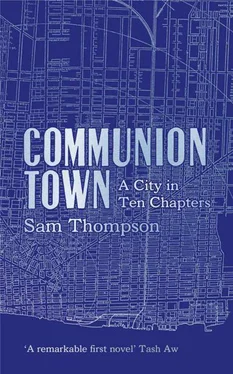‘“Every action, however tiny, alters the meaning of the whole system. Why do you suppose the city quivers daily with my crimes? Any student of the Rhetorica Ad Herennium knows that we remember best if the images with which we populate our memory houses are vivid and violent, exceptionally beautiful or ugly, dressed in crowns and purples or disfigured and splashed with blood. Why do you suppose I keep you so well supplied with the bizarre mysteries and richly coloured atrocities to which you are addicted? None of you realise that when you walk through your crime-riddled city, you are moving among my thoughts.”
‘“And what of the citizens?” I asked. “Do you believe their lives have no value in themselves?”
‘Lazarus shrugged as though the question did not interest him. “They, too, are part of the pattern. All things are symbols, all have their place in the web of relations. What meaning would the city’s detectives have if there were no criminals for them to chase? Or take you and me. We were like twin brothers: we still are. Is our ancient rivalry not the axis of our lives? And does the life of the city, too, not turn on that axis, as I commit my crimes and you solve them, as you pursue me and I escape? You are the image by which I remember myself, Peregrine. Without you I would not be Lazarus Glass.”
‘He was silent for a time, standing there in my consulting room.
‘“My responsibilities weigh heavily,” he said. “But there is no other course for me now.”
‘As he left, neither of us offered a handshake. We exchanged only an ambiguous glance: an unspoken recollection of the past. That was the last time I saw him.’
Peregrine stood without moving, his head bowed to the shadow between the tramlines. The drizzle had stopped and the floodlights on the Palace were growing fainter as the rest of the scene came into view.
‘Revenge, then,’ said the inspector eventually. ‘Thorne stopped Glass from doing what he wanted with the metro, so Glass used the metro to murder him. The same as Professor Weill and Dr Cavendish-Peake: Lazarus Glass held a grudge against each of them because they’d got the better of him in the past, and so he killed them in some way that seemed appropriate to his sick mind. Revenge. That’s all there is to it?’
‘On the contrary,’ Peregrine said. ‘Tonight’s crimes amount to far more than revenge.’
For a long moment, he pressed his fingertips to his brows. When he raised his head again, towards the river and the plumes of dawn light leaking into the sky behind the roofline, he looked more tired than I had ever seen him.
‘It is time we returned to where we began.’
No enemy accosted us as we made our way back to the mews in Syme Gardens where Peregrine had his consulting rooms. The twilit streets and brightening sky might have been ours alone. Peregrine tolerated the inspector’s wish to climb the stairs first, and to ease his way into the rooms with his sidearm drawn; but all was undisturbed.
‘The full evidence is now at our disposal,’ said Peregrine as he settled himself on the Chesterfield. ‘It only remains to assimilate the meaning of what we have seen tonight, and draw our conclusions. Cassandra, here I turn to you. Your apprenticeship with me is approaching its close, and I find myself hoping very much that you will make this present conundrum into the first success of your own crime-solving career.’
‘I’ll try my best,’ I said, unsettled again by the peculiar cadence in Peregrine’s voice. ‘And I think I start to see a way of understanding what has taken place.’
‘I’m glad one of us does,’ said the inspector.
‘We have visited the scenes of three murders tonight,’ I began, ‘and we know the link between them. These fallen detectives were close on the trail of Lazarus Glass, and so we may fairly suppose that he wished to strike them down. But in the manner of the killings — each grotesque and excessive in its way — we find other reasons too. Each murder vengefully recalled some incident in which the detective concerned had foiled the arch-criminal. Glass seems determined to load his killings with private symbolism.’
Peregrine, reclining with his eyes closed, looked serene.
‘And in the history of Lazarus Glass’s intellectual development, we have found an explanation for this, in turn,’ I said. ‘His criminal career, we now know, is directed by his conviction that the city and his mind are identical. In his memory city, events such as the deaths of detectives must be dense with significance, and the particular manner of those deaths, too, must be all-important for his deranged purposes.
‘For Glass, the deaths of Hyperion Weill, Electra Cavendish-Peake and Brutus Thorne surely represent crucial changes in the pattern of the city that is his mind. One might say that, tonight, we have walked through the architecture of Lazarus Glass’s brain, and witnessed the lingering presence of three of his more vivid and memorable thoughts.’
‘This is a promising line of analysis,’ said Peregrine.
‘But what about you, Dr Fetch?’ asked the inspector. ‘If Glass wants to liquidate all the detectives hunting him, then he isn’t finished yet, and you’re not safe. You said yourself you were leading the chase. If I understand any of this, Glass is planning to kill you too, and we’re still no closer to finding him.’
‘It is true that the night’s work is not finished,’ said Peregrine. ‘And true, too, that we do not know the whereabouts of Lazarus Glass. But that information is not necessary for us to defeat him. Cassandra: would you care to continue?’
‘Lazarus’s mental peculiarities, as you have described them, are extreme,’ I said. ‘And while they endow him with arcane capabilities, they would seem also to constrain him. For instance, if, as he said to you, he is convinced that detectives and criminals only have meaning by virtue of their interlocking struggle, then the massacre of his opponents tonight, while in one sense a victory, must in another way leave him greatly diminished: in a city lacking three such eminent investigators, the arch-criminal must himself be so much less significant.
‘And if that is so, how much more true it must be of his relationship with you, Dr Fetch. In spite of the famous hatred he nurses for you, his old friend, his rival, his adversary, his nemesis — indeed, because of that hatred, I hypothesise that you need not fear assassination at the hand of your former comrade. He cannot eliminate you without also eliminating himself: for he said that he would not be Lazarus Glass without you.’
‘You’re not forgetting that the man’s a lunatic, are you?’ said Inspector Nimrod. ‘You are bearing in mind that the city’s actually a city , not the inside of this psychopath’s head?’
‘Your bluff sanity is refreshing, inspector,’ said Peregrine, ‘but, I fear, irrelevant. The reality that pertains in this case is that of Lazarus Glass’s perceptions; the city we have explored tonight has indeed been the memory city of Lazarus Glass.’
‘Which brings me to my last point,’ I said. ‘Glass boasted that his memory city enabled him to influence events in reality. But if the relationship between city and mind is as perfect as he claims, if every one of his thoughts is manifested in the city, then the reverse must also be the case: he must experience everything that happens in the city as an event in his mind. He saw the memory city as his great invention, but it seems to me that his plight is terrible to contemplate. He is unable to think without committing a crime to represent that thought; and, more than this, anyone can deliberately interfere with the constitution of his mind, by creating or destroying the symbols, out in the city, that embody his ideas.
Читать дальше
Конец ознакомительного отрывка
Купить книгу












